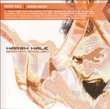| All Artists: Jean Richafort, Huelgas Ensemble, Paul van Nevel Title: Richafort: Requiem in memoriam Josquin Desprez; Motets /Huelgas Ensemble * P van Nevel Members Wishing: 1 Total Copies: 0 Label: Harmonia Mundi Fr. Release Date: 7/9/2002 Album Type: Import Genre: Classical Styles: Opera & Classical Vocal, Historical Periods, Early Music Number of Discs: 1 SwapaCD Credits: 1 UPC: 794881670123 |
Search - Jean Richafort, Huelgas Ensemble, Paul van Nevel :: Richafort: Requiem in memoriam Josquin Desprez; Motets /Huelgas Ensemble * P van Nevel
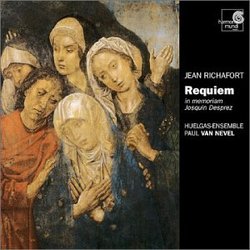 | Jean Richafort, Huelgas Ensemble, Paul van Nevel Richafort: Requiem in memoriam Josquin Desprez; Motets /Huelgas Ensemble * P van Nevel Genre: Classical
|
Larger Image |
CD DetailsSimilarly Requested CDs
|
CD ReviewsA marvelous recording of an unjustly neglected composer islandtoad | Albuquerque, New Mexico United States | 07/15/2002 (5 out of 5 stars) "For a composer whose works served as models for some of the greatest composers of his day--Morales, Gombert, and Palestrina, to name a few--Jean Richafort is surprisingly little known today. This recording attempts to change this, offering a selection of motets and chansons along with the stunning Requiem mass Richafort wrote to commemorate Josquin Desprez's death in 1521. The Huelgas Ensemble's characteristically warm, rich tone serves the works (especially the Requiem and the Salve) well, lending them a contemplative, spiritual air that puts one in mind of the vast cathedrals and monestaries in which they would have been sung. The chansons, on the other hand, have a bounce and vivacity in keeping with their worldly nature. (The drinking song "Tru, Tru, Trut Avant," probably my favorite track on the album, has so much energy and is so catchy that it will make you want to dance, and will likely make you thirsty as well.) This isn't the only Richafort CD available (the Chapelle du Roi have also released one), but it is certainly the best. (The Chapelle's counter-tenor is very noticeable, and their blend is less seamless than that of the Huelgas Ensemble, although their Latin is a little easier to understand.) The only other thing I can say against the Huelgas recording is that it lacks the "Quem Dicunt Homines" Paul Van Nevel makes so much of in the liner notes, which would have been nice to hear; nonetheless, all of the pieces on the recording are well worth hearing, so this is not much of a complaint. All told, the ensemble's impeccable blend, tone, and musicality do a marvelous job of bringing one of the most talented composers of the Renaissance out of obscurity, and make this CD a must have for lovers of Early Music and choral music alike." Neglected masterpiece ldk1609 | 01/16/2003 (5 out of 5 stars) "Jean Richafort's stunning requiem a 6 was written in memorial for his contemporary; Josquin. They are similar stylistically but from the first few seconds of the introitus the awareness dawns that one is in the presence of a fully fledged master in his own right. Imagine Josquin but transformed into smoother, more mannered lines, more intricate and subtle counterpoint and a manipulation of voicing and sonority quite unlike anything else you've heard. The architecture is still there but one becomes so bewitched by the sonic filigree unfolding that one scarcely notices. The whole requiem is very quiet and serene, beautifully paced and with a pliant expressiveness that makes you wonder where this manuscript has been hiding all this time. (Well done Paul van Nevel!) Probably the most interesting feature of the requiem in my opinion is that each of it's movements wind down softly to end on plagal cadences (chord IV-1) compared to the ubiquitous perfect (chord V-1). I don't know of anywhere else in classical music where this device is employed so consistently and beautifully. The effect as the last notes dissolve into nothingness is unforgettable and will leave you with the realisation that perfect cadences are way to harsh on the ear in comparison!! This sole recording of the requiem has amazing clarity, presence and depth to complement the ensemble's superb purity, balance and general culture. It will leave you panting for their next project..." Eyewatering :*( another reader | 04/28/2006 (5 out of 5 stars) "Requiems seem to me to be intense, dark or depressing; however this one is more sad than dark. It's obvious that Richafort was heartbroken when his hero Josquin died, especially when hearing the first 10-12 minutes of his requiem. It's also obvious that Richafort, as someone else said, was truly a master in his own right to be able to write music like this. I don't think it sounds like Josquin though. The long, effortless lines (in the beginning anyway) make me think of Palestrina instead. Midway through the graduale the requiem becomes slightly faster and more intense. Among the other tracks, as others have mentioned the Salve Regina & Tru Tru Tru Avant also stand out. Tru Tru Tru Avant is fun to listen to, and somewhat surprising to me since the rest of the album is fairly serious. The Salve Regina is also a masterpiece, but the Requiem is still the centrepiece of this album for sure. I only wish the Huelgas Ensemble included the motet Quem Dicunt Homines on the disc. It is allegedly another masterpiece which is mentioned in the liner notes a few times, but not recorded."
|

 Track Listings (13) - Disc #1
Track Listings (13) - Disc #1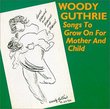
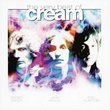
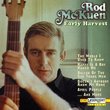
![Seussical [2000 Original Broadway Cast]](https://nationalbookswap.com/cd//m/02/4802/514802.jpg)



